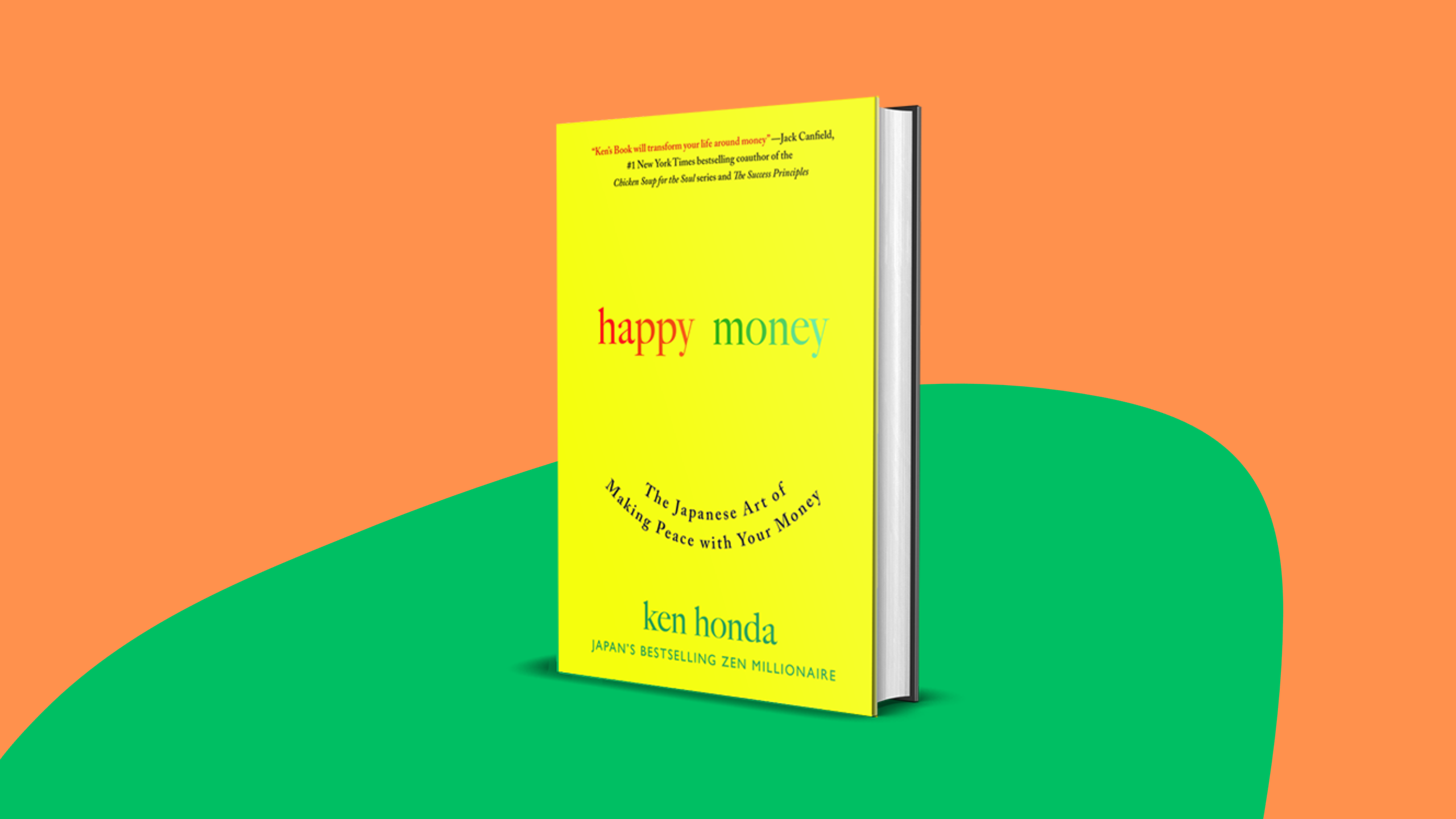"Happy Money" by Ken Honda explores the relationship between money and happiness, presenting a perspective emphasising money management's emotional and spiritual aspects. The book suggests that money can bring joy when it is used to create positive experiences, express gratitude, and foster meaningful connections with others.
💭 The Book in 3 Sentences:
- The way we approach and use money can significantly impact our happiness.
- Adopting a mindset of appreciation and mindful spending allows us to transform our financial habits into a source of happiness and contentment, ultimately leading to a more fulfilling and harmonious life.
- Through practical advice and anecdotes, Honda highlights how a positive money mindset can lead to a happier and more balanced life.
🎯 Who should read it?
This book is very helpful for individuals seeking to improve their relationship with money. Specifically, the book is great for:
- People who are seeking to cultivate a more positive and mindful approach to finances and enhance their overall sense of happiness and well-being.
- People who are interested in understanding the emotional and psychological aspects of money.
- Those looking to create a more harmonious connection between their financial decisions and their values.
📈 How the Book Has Helped Me
- The book's insights and practical advice have transformed how I view and manage my finances.
- This book has empowered me to make more mindful spending decisions and has allowed me to prioritise what truly matters, resulting in a more fulfilling and balanced life.
📝 My Notes + Takeaways:
1) Value Intangible Wealth
Recognize that wealth extends beyond monetary assets to include relationships, health, and personal growth, which contribute significantly to overall happiness.
While financial success is certainly a key component of a fulfilling life, it is not the only factor that contributes to overall happiness. Relationships, health, and personal growth are also essential components of a happy and prosperous life. Building strong relationships with friends and family can provide a sense of security and belonging that money simply cannot buy.
Similarly, taking care of your physical and mental health can help you enjoy a long and fulfilling life, allowing you to pursue your goals and aspirations with greater ease and confidence. And finally, investing in personal growth and development can help you become the best version of yourself, unlocking new opportunities and experiences that can enrich your life in countless ways.
2) Avoid Emotional Spending
Be aware of using money as a way to cope with emotions. Developing healthier coping mechanisms can prevent overspending driven by stress or negative feelings.
I love this quote by Natasha Munson that perfectly summarises the lesson:
“Money, like emotions, is something you must control to keep your life on the right track.” ― Natasha Munson
Instead of impulsively buying something to make oneself feel better, one could try going for a walk, practising deep breathing exercises, or talking to a trusted friend or therapist. Taking the time to identify and address the root cause of negative emotions can also prevent emotional spending in the long term.
3) Mind Your Money Conversations
Engaging in open and honest discussions about money is a crucial step towards achieving financial growth. When you have these conversations with loved ones, it can help to create a safe and supportive environment for all parties involved.
Here are a few tips to make sure your money conversations are effective and respectful:
- Be clear about your financial goals and priorities. Sharing your financial goals with your loved ones can help them understand where you are coming from and what you hope to achieve.
- Listen to each other's perspectives and experiences. Everyone has their own unique relationship with money, and it's important to be open-minded and empathetic to other people's experiences.
- Be honest and transparent about your financial situation. Hiding financial struggles or successes can create unnecessary tension and mistrust in relationships. Honesty is key to building a foundation of trust and support.
- Work together to come up with solutions. When you have different perspectives or financial priorities, it can be helpful to work together to find creative solutions that work for everyone involved.
4) Give Generously
Sharing your wealth, whether through donations, acts of kindness, or gifts, can evoke feelings of fulfilment and create a positive impact on your well-being. One way to give generously is to donate to charities or non-profit organizations that align with your values and beliefs.
You can also give your time and volunteer at local community centres or participate in fundraising events. Another way to practice generosity is through small acts of kindness such as buying a coffee for a stranger or helping a neighbor with their groceries.
Not only will this create a positive impact on your well-being, but it can also inspire others to do the same and create a ripple effect of kindness in your community and beyond.
5) Practice Detachment
While money is a tool, it shouldn't define your self-worth. Detaching your sense of identity from your financial status can free you from unnecessary stress and allow you to enjoy a more authentic and fulfilling life.
“Detachment is not that you should own nothing. But that nothing should own you.” Ali ibn Abi Talib
Detachment allows us to enjoy a more authentic and fulfilling life, one that is not hindered by the constant pressure to accumulate more wealth. We can find value in other aspects of our lives, such as our relationships, our hobbies, our passions, and our personal growth. By practising detachment, we can learn to appreciate the richness of life beyond our bank accounts.
💡My Favourite Quotes:
- “Whatever happens, you can say thank you. Thank you are two most powerful words that will help you to start to transform your relationship with money.”
- “Money EQ is more important than money IQ.”
- “Worrying about money is an addiction that keeps you from focusing on what else is going on in your life.”
- “It is not how much you make or have that makes you have Happy Money or Unhappy Money, it is the energy in which your energy is given and received that determines your flow.”
- “Money is the end result of what we get AFTER serving the world.”



"Happy Money" by Ken Honda explores the relationship between money and happiness, presenting a perspective emphasising money management's emotional and spiritual aspects. The book suggests that money can bring joy when it is used to create positive experiences, express gratitude, and foster meaningful connections with others.
💭 The Book in 3 Sentences:
🎯 Who should read it?
This book is very helpful for individuals seeking to improve their relationship with money. Specifically, the book is great for:
📈 How the Book Has Helped Me
📝 My Notes + Takeaways:
1) Value Intangible Wealth
Recognize that wealth extends beyond monetary assets to include relationships, health, and personal growth, which contribute significantly to overall happiness.
While financial success is certainly a key component of a fulfilling life, it is not the only factor that contributes to overall happiness. Relationships, health, and personal growth are also essential components of a happy and prosperous life. Building strong relationships with friends and family can provide a sense of security and belonging that money simply cannot buy.
Similarly, taking care of your physical and mental health can help you enjoy a long and fulfilling life, allowing you to pursue your goals and aspirations with greater ease and confidence. And finally, investing in personal growth and development can help you become the best version of yourself, unlocking new opportunities and experiences that can enrich your life in countless ways.
2) Avoid Emotional Spending
Be aware of using money as a way to cope with emotions. Developing healthier coping mechanisms can prevent overspending driven by stress or negative feelings.
I love this quote by Natasha Munson that perfectly summarises the lesson:
Instead of impulsively buying something to make oneself feel better, one could try going for a walk, practising deep breathing exercises, or talking to a trusted friend or therapist. Taking the time to identify and address the root cause of negative emotions can also prevent emotional spending in the long term.
3) Mind Your Money Conversations
Engaging in open and honest discussions about money is a crucial step towards achieving financial growth. When you have these conversations with loved ones, it can help to create a safe and supportive environment for all parties involved.
Here are a few tips to make sure your money conversations are effective and respectful:
4) Give Generously
Sharing your wealth, whether through donations, acts of kindness, or gifts, can evoke feelings of fulfilment and create a positive impact on your well-being. One way to give generously is to donate to charities or non-profit organizations that align with your values and beliefs.
You can also give your time and volunteer at local community centres or participate in fundraising events. Another way to practice generosity is through small acts of kindness such as buying a coffee for a stranger or helping a neighbor with their groceries.
Not only will this create a positive impact on your well-being, but it can also inspire others to do the same and create a ripple effect of kindness in your community and beyond.
5) Practice Detachment
While money is a tool, it shouldn't define your self-worth. Detaching your sense of identity from your financial status can free you from unnecessary stress and allow you to enjoy a more authentic and fulfilling life.
Detachment allows us to enjoy a more authentic and fulfilling life, one that is not hindered by the constant pressure to accumulate more wealth. We can find value in other aspects of our lives, such as our relationships, our hobbies, our passions, and our personal growth. By practising detachment, we can learn to appreciate the richness of life beyond our bank accounts.
💡My Favourite Quotes:
Read Next
Is Consuming Coffee Healthy?
Coffee, the aromatic drink cherished by millions worldwide, has been a staple in human culture for centuries. So, is consuming coffee healthy? Beyond its rich flavour and inviting aroma, coffee boasts a plethora of effects on both mind and body. However, indulging in this beloved beverage comes with both advantages
7 Superfoods that Boost Your Productivity
Did you know that the foods you eat can have a significant influence on your brain and motivation? According to the World Health Organisation, the right foods can boost your motivation, brain power and overall productivity by up to 20%. On the other hand, a study conducted by researchers at
Boosting Your Visibility as an Introvert
Compared to their extroverted counterparts, many introverts find themselves feeling overshadowed or overlooked in professional settings. However, being introverted doesn't mean you have to remain invisible at work. There are strategic and authentic ways for introverts to make themselves seen and heard without compromising their natural tendencies. Embrace
When Breath Becomes Air by Paul Kalanithi - Book Summary, Notes and Highlights
"When Breath Becomes Air" is a poignant memoir by Paul Kalanithi, a neurosurgeon diagnosed with terminal lung cancer. The book chronicles his journey from being a promising medical professional to facing his mortality. Paul grapples with profound questions about life and death, finding meaning in the face of